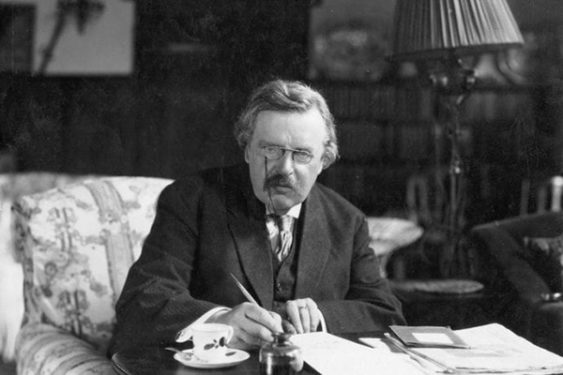
By Christopher White, The Tablet’s National Correspondent
LONDON – For decades, the Catholic writer G.K. Chesterton has enjoyed greater popularity in the United States than in his homeland of Great Britain – and now an American university’s UK campus will showcase the writer’s own collection.
Earlier this year, the University of Notre Dame announced it has acquired the G.K. Chesterton Library from the Oxford Oratory, which is set to be opened to the public in fall 2020.
The orator, apologist, and scholar, who was a high profile convert to Catholicism, is known for his serious intellectual works, such as ‘Orthodoxy’ and ‘The Everlasting Man,’ but also for his fictional writings, such as ‘The Man Who Was Thursday’ and his popular ‘Father Brown’ mystery series.
Now, at a time when Chesterton’s popularity continues to rise – including efforts to promote his cause for canonization – Notre Dame’s London Global Gateway will provide Chesterton enthusiasts a chance to see firsthand his own book collection and artifacts in a more accessible way than ever before.
JoAnn DellaNeva, academic director of the London Global Gateway and professor of Romance languages and literatures, told The Tablet that the acquisition evidences the “triangulation between the British intellectual community, Chesterton, and the home campus of Notre Dame,” where Chesterton received an honorary doctorate in 1930.
Situated in the heart of London’s Trafalgar Square and a short walk from Parliament, Notre Dame’s Global Gateway first began conversations with the Oxford Oratory two years ago when their librarian, Father Jerome Bertram, expressed concern that due to space issues, the Oratory could no longer “do justice” to the works, especially when it came to accommodating last minute requests from visitors and researchers.
A team from Notre Dame visited Oxford and began conversations with Oratory officials, ultimately leading to a winning proposal with the university guaranteeing that it would offer the necessary resources to preserve the collection and ensuring that it remains in Great Britain.
“It makes so much sense for it to be here,” Father Jim Lies, director for Catholic initiatives and outreach at the London Global Gateway told The Tablet. “He related more to London; more than Oxford or Cambridge.”
“The fact that it would be London, even from Chesterton’s perspective, seems to make more sense,” he added.
Lies said that he believes the acquisition is an opportunity for the university both to take advantage of their London location, as well as to strengthen its ties to the local academic community, which the Global Gateway program believes to be a signature part of its mission.
“The wonderful thing about Chesterton is that he was a real polymath,” DellaNeva said, noting that Chesterton wrote prolifically on a range of topics from art and literature to theology and science.
She believes that the collection will excite scholars from all sorts of backgrounds and provide the occasion to host multidisciplinary events for Notre Dame faculty and local researchers.
Both Lies and DellaNeva credit Aidan Mackey, one of the world’s leading Chesterton experts, for helping secure the collection.
Mackey, now 97 years old, has been responsible for building up the library for several decades, which includes not only Chesterton’s writings, but also various works that are reactions to his own, as well as artifacts, including a rosary found in his pockets after his death.
DellaNeva said that among the items she is most excited for individuals to explore are the margins of Chesterton’s books, which contains a range of drawings and “reactions” to what he was reading at the time.
“The manner in which he engaged with books and readings is largely unexplored territory,” she said.
Lies recalled that when Chesterton was invited to lecture and receive an honorary doctorate at Notre Dame, he remarked that “he was not certain where it was, but with a name like that, even if it were in the mountains of the moon, he should feel at home.”
Now, that same university will get to provide a permanent home for his works in his own country.
“There’s much in the collection that is unexplored. So we’re all going to have some fun digging through it,” said Lies. “I’m just very grateful that we have this opportunity to steward it.”
